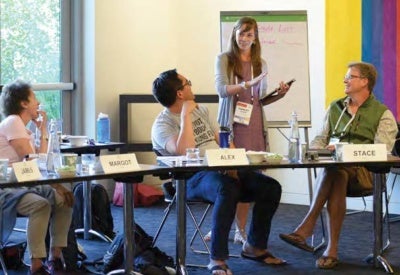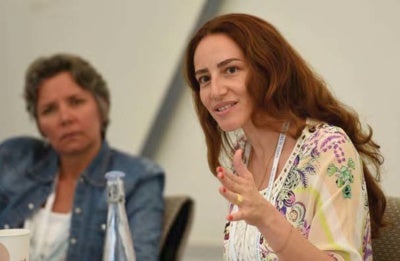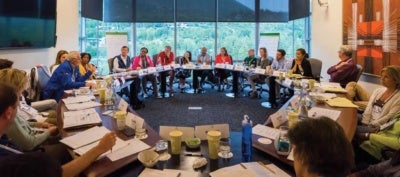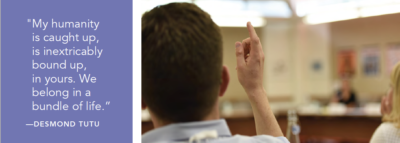“Are there things festering in your life that require forgiveness?”
A hushed silence falls over the room, while some slightly bow their heads or fold their arms in thought. We are in a seminar discussing Desmond Tutu’s “No Future Without Forgiveness,” and I’m observing from the staff table in the back. The group has just discussed the horrible atrocities committed against South Africans during apartheid, and how miraculously, when apartheid was overturned, the country chose a form of forgiveness through a truth and reconciliation process.
The moderator pauses, fighting the natural urge to break that palpable silence, until some brave soul speaks up…

Building the Moderator Corps: Moderator trainees gather every fall for a week-long workshop thanks to the support of Aspen Institute trustee, Paul Anderson, and his wife, Mary.
Moderators don’t just ask questions. They push and prod even though it’s against their social instinct to meddle in others’ business. In fact, being “polite” goes out the window. No skirting politics, opinions, or religion. No ignoring life’s sorrow and hurt. Not because moderators want to be provocative for the sake of being provocative, but because it’s the only way to make sure the Fellows haven’t wasted time simply philosophizing.
The act of moderating is reminiscent of Tutu’s description of one who possesses the quality of ubuntu: “You are friendly and caring and compassionate. You share what you have. It is to say, ‘My humanity is caught up, is inextricably bound up, in yours. We belong in a bundle of life.’” Moderators seek to unveil what makes us uncomfortable and share in each individual’s struggle while practicing unconditional respect for all.

Chadia El Meouchi Naoum (right) moderator for Middle East Leadership Initiative.
But wait a second, unconditional respect? We’ve all experienced individuals who act as a sort of emotional sandpaper for us. They may have a vastly different life experience that makes them unrelatable, they may espouse a view that makes us cringe, or they may simply just have traits we don’t like. It’s no different for moderators, except they choose to set aside their personal views for the sake of the whole group. “An excellent moderator creates a sense of ultimate belonging as he or she invites people, individually and collectively, to fully explore and become their best selves,” says Adria Goodson, moderator for Pahara – Aspen Education Fellowship. To call on Tutu’s words once again, moderators are “open and available to others, affirming of others, [do] not feel threatened that others are able and good, for [they have] a proper self-assurance that comes from knowing that [they belong] in a greater whole and [are] diminished when others are humiliated or diminished, when others are tortured or oppressed, or treated as if they were less than who they are.”
That is really hard to do.
So why do it at all? “The world is full of people who have, can, and want to follow values of justice and service,” says James Abraham, senior moderator for the Kamalnayan Bajaj Fellowship. “When we discover we’re not alone, when we discover our values don’t have to hinder our success, we all become so much more empowered.” It is with this purpose in mind that a moderator takes up the mantle to create a space free of judgment, allow others to self-explore, and build a community deeply committed to supporting one another. Then, and only then, may Fellows reenter the world with a mind toward solving what’s gone wrong.
Fostering this kind of action is more art than science, and often takes a toll on the moderators. But its impact is undeniable. Chadia El Meouchi Naoum, moderator for the Middle East Leadership Initiative, describes her greatest challenge as when a Fellow shared an experience that made her lose emotional composure. “I had to continue moderating, despite wanting to take care of the Fellow and express my deep pain for him, while also wanting to be alone to process my own pain.” But Chadia also acknowledges that these exposed vulnerabilities and trust felt by and for each person in the room are the right conditions for provoking an individual towards transformational change and taking meaningful action.

Moderators prepare for the seminar dialogues at the annual Resnick Aspen Action Forum.
Moderators are essential to carrying forward the tradition the Aspen Institute was built on and helping leaders realize their unique imperative in the world. “We are like the roots of the aspen trees, a single organism united underground. No one can see our deep roots interconnected in our own humanity, but it is what makes us thrive,” says Hildegard Vasquez, moderator for the Central America Leadership Initiative. “In those magical moments at the moderating table, we feel that inner humanity or ubuntu: ‘I am because we are.’”
…Back in the seminar, the group continues to discuss the idea of forgiveness. Again, the moderator gently probes the group: “Can you find it in yourself to grant forgiveness for the things which require it in your life?”
Another hushed silence ensues, while one Fellow begins to cry. His Fellows pass along tissues and the ones near him touch his shoulder or his hand. He takes a deep breath to begin his story…
Unconditional respect, love, and vulnerability takes self-sacrifice and courage. But as leaders being asked the difficult questions of humanity and equipped with a beautiful community to help guide us, it is, perhaps, our highest purpose to practice those values toward one another. May we each practice ubuntu and in so doing recognize the hope and promise of our shared future.
